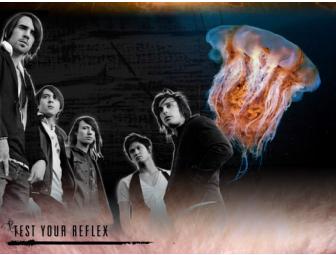CD - Rock- Test Your Reflex: "The Burning Hour"

Item Number: 564
Time Left: CLOSED
Description
It's not all that difficult to convey gloom through music, nor is it much of a stretch to stay focused on the sunny side of life. It takes something special, however, to portray both the cloud and the silver lining with equal intensity -- and that ability is the secret to Test Your Reflex's success.
"Ever since I was young, growing up listening to the Beatles with my dad, I've always associated music with optimism," says Test Your Reflex frontman Ryan Levine. "I don't think you need to go to a dark place to be creative. I'm not positive just to be positive, and I think there's a bittersweet feel to a lot of the songs, but I would rather uplift people than bring them down."
On its RCA debut The Burning Hour, the Southern California-bred quintet succeeds in doing just that, thanks not only to Levine's instantly-relatable allegories, but to the immediately ensnaring hooks that permeate the disc's 11 vivid tunes. From the sweeping grandeur of the opening "I'm Not Sorry" -- which envelops the listener in a cocoon of warmly pulsing bass and brightly spangled piano -- to the final notes of the siren-song closer "Painted Red," Test Your Reflex grab a firm hold on the heart, the head and the hips.
"We wrote for two years before we went into the studio, and we were really inspired by records that sounded big," says Levine. "We started out listening to a lot of danceable stuff, but we'd always go back to U2's Joshua Tree and Peter Gabriel's So -- two albums that are just rock solid from beginning to end and that just go for it. Because of that, we didn't shy away from big choruses or big production -- we wanted every song to be a journey."
The quintet's own journey began a little over three years ago, when its members began hosting shows at a recreation center in southern California -- a venue choice necessitated in part by the fact that all were still too young to gain entrance to the clubs they'd soon be selling out. All five had prior grounding in various styles -- guitarist Clark did time in what Levine describes as "a really thrashy, dirty-sounding, desert rock band," while Andrew Ampaya spent years being classically trained on piano -- which contributes considerably to the iconoclastic TYR sound.
"We came together with some similar influences, a lot of them coming from things that are really danceable, like Depeche Mode, and a lot that were more atmospheric, like David Bowie or especially Brian Eno," says Levine. "We like that sort of mysterious aspect to things, but it's also really cool to get an audience up and moving, get them really involved, and that's where the rhythm comes in."
That shared consciousness has allowed the band to develop the sort of instinctive dialogue that allows them to deftly glide from crunching, guitar-driven rockers like "New Year" and "Pieces of the Sun" to sleek, synth-laced confections like "Black Hearts." Those elements collide head-on in the soaring, harmony-driven "I Am Alive," perhaps the album's boldest statement of purpose -- to convince listeners that things really are going to be alright after all.
Levine reckons that he came to just that conclusion shortly after beginning work on The Burning Hour, an album whose title was inspired by a visit to a Southern California strip club. He claims, with polygraph-perfect plausibility, that the jaunt was suggested by a girlfriend who was studying the psychology of sexuality -- but rather than a Motley Crue-styled epiphany, he recalls feeling a sense of discomfort and dislocation.
"Seeing the people there and seeing the look on the dancers' faces really affected me," he recalls. "I was sitting there and it was kind of depressing, just watching these men who seemed so desperate and hopeless, and behind the façade of the personas they were trying to portray, the strippers obviously felt the same way. The Burning Hour represented that for me -- a metaphor for fighting against apathy and emptiness that I saw there." "I have to admit that there was one guy that seemed to actually be having fun" he added with a smile "unfortunately it wasn't me."
Virtually every song on The Burning Hour resonates with that passion -- and by the time its final chords ring out, it's obvious that apathy and emptiness could never win when faced with a sound and vision this powerful.
Special Instructions
Promo CD